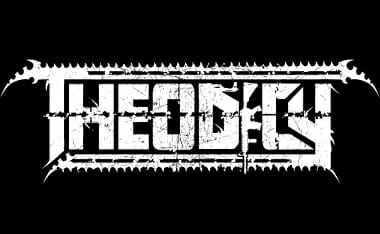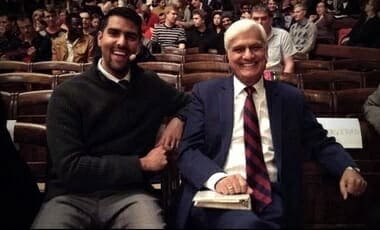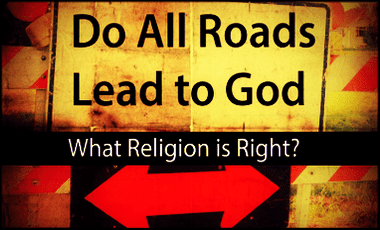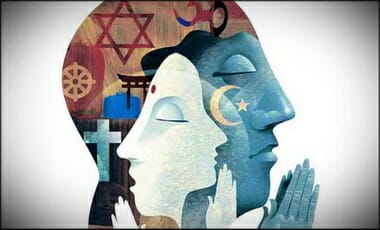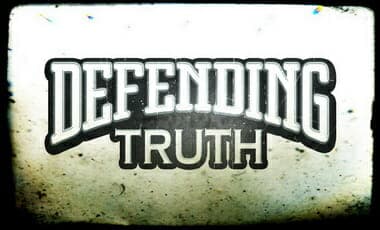Originally posted January of 2016 – fixed some media today
Description of the above video:
- If there is a God, why is there so much evil? How could any God that cares about right and wrong allow so much bad to happen? And if there is no God, who then determines what is right and what is wrong? The answers to these questions, as Boston College philosopher Peter Kreeft explains, go to the heart of ethics, morality and how we know what it means to be a decent person.
The moment you say that one set of moral ideas can be better than another, you are, in fact, measuring them both by a standard, saying that one of them conforms to that standard more nearly than the other. But the standard that measures two things is something different from either.
[….]
My argument against God was that the universe seemed so cruel and unjust. But how had I got this idea of just and unjust? A man does not call a line crooked unless he has some idea of a straight line. What was I comparing this universe with when I called it unjust?
C.S. Lewis, Mere Christianity (Grand Rapids, MI: Zondervan, 2002), 13, 38.
Description of the above video:
- Isn’t human suffering proof that a just, all-powerful God must not exist? On the contrary, says Boston College Professor of Philosophy Peter Kreeft. How can “suffering” exist without an objective standard against which to judge it? Absent a standard, there is no justice. If there is no justice, there is no injustice. And if there is no injustice, there is no suffering. On the other hand, if justice exists, God exists. In five minutes, learn more.
Description of the above video:
- A student asks a question of Ravi Zacharias about God condemning people [atheists] to hell. This Q&A occurred after a presentation Ravi gave at Harvard University, and is now one of his most well-known responses in the apologetic sub-culture. This is an updated version to my 2nd edit of this on my YouTube.
Description of the above video:
- Is evil rational? If it is, then how can we depend on reason alone to make a better world? Best-selling author Dennis Prager has a challenging answer.
Description of the above video:
- Atheists Trying to Have Their Cake and Eat It Too on Morality. This video shows that when an atheist denies objective morality they also affirm moral good and evil without the thought of any contradiction or inconsistency on their part.
EVERY ONE HAS HEARD people quarreling. Sometimes it sounds funny and sometimes it sounds merely unpleasant; but however it sounds, I believe we can learn something very important from listening to the kinds of things they say. They say things like this: “How’d you like it if anyone did the same to you?”–‘That’s my seat, I was there first”–“Leave him alone, he isn’t doing you any harm”–“Why should you shove in first?”–“Give me a bit of your orange, I gave you a bit of mine”–“Come on, you promised.” People say things like that every day, educated people as well as uneducated, and children as well as grown-ups.
 Now what interests me about all these remarks is that the man who makes them is not merely saying that the other man’s behavior does not happen to please him. He is appealing to some kind of standard of behavior which he expects the other man to know about. And the other man very seldom replies: “To hell with your standard.” Nearly always he tries to make out that what he has been doing does not really go against the standard, or that if it does there is some special excuse. He pretends there is some special reason in this particular case why the person who took the seat first should not keep it, or that things were quite different when he was given the bit of orange, or that some thing has turned up which lets him off keeping his promise. It looks, in fact, very much as if both parties had in mind some kind of Law or Rule of fair play or decent behavior or morality or whatever you like to call it, about which they really agreed. And they have. If they had not, they might, of course, fight like animals, but they could not quarrel in the human sense of the word. Quarreling means trying to show that the other man is in the wrong. And there would be no sense in trying to do that unless you and he had some sort of agreement as to what Right and Wrong are; just as there would be no sense in saying that a footballer had committed a foul unless there was some agreement about the rules of football.
Now what interests me about all these remarks is that the man who makes them is not merely saying that the other man’s behavior does not happen to please him. He is appealing to some kind of standard of behavior which he expects the other man to know about. And the other man very seldom replies: “To hell with your standard.” Nearly always he tries to make out that what he has been doing does not really go against the standard, or that if it does there is some special excuse. He pretends there is some special reason in this particular case why the person who took the seat first should not keep it, or that things were quite different when he was given the bit of orange, or that some thing has turned up which lets him off keeping his promise. It looks, in fact, very much as if both parties had in mind some kind of Law or Rule of fair play or decent behavior or morality or whatever you like to call it, about which they really agreed. And they have. If they had not, they might, of course, fight like animals, but they could not quarrel in the human sense of the word. Quarreling means trying to show that the other man is in the wrong. And there would be no sense in trying to do that unless you and he had some sort of agreement as to what Right and Wrong are; just as there would be no sense in saying that a footballer had committed a foul unless there was some agreement about the rules of football.
(accuser) “How’d you like it if anyone did the same to you?”
(responder) “Your right, I apologize.”
(accuser) “That’s my seat, I was there first!”
(responder) “Your right, you were. Here you go.”
(accuser) “Give me a bit of your orange, I gave you a bit of mine.”
(responder) “Oh gosh, I forgot, here you go.”
(accuser) “Come on, you promised.”
(responder) “Your right, lets go to the movies.”
Now this Law or Rule about Right and Wrong used to be called the Law of Nature. Nowadays, when we talk of the “laws of nature” we usually mean things like gravitation, or heredity, or the laws of chemistry. But when the older thinkers called the Law of Right and Wrong “the Law of Nature,” they really meant the Law of Human Nature. The idea was that, just as all bodies are governed by the law of gravitation and organisms by biological laws, so the creature called man also had his law–with this great difference, that a body could not choose whether it obeyed the law of gravitation or not, but a man could choose either to obey the Law of Human Nature or to disobey it.
This law was called the Law of Nature because people thought that every one knew it by nature and did not need to be taught it. They did not mean, of course, that you might not find an odd individual here and there who did not know it, just as you find a few people who are color-blind or have no ear for a tune. But taking the race as a whole, they thought that the human idea of decent behavior was obvious to every one. And I believe they were right. If they were not, then all the things we said about the war were nonsense. What was the sense in saying the enemy were in the wrong unless Right is a real thing which the Nazis at bottom knew as well as we did and ought to have practiced! If they had no notion of what we mean by right, then, though we might still have had to fight them, we could no more have blamed them for that than for the color of their hair.
I know that some people say the idea of a Law of Nature or decent behavior known to all men is unsound, because different civilizations and different ages have had quite different moralities.
But this is not true. There have been differences between their moralities, but these have never amounted to anything like a total difference. If anyone will take the trouble to compare the moral teaching of, say, the ancient Egyptians, Babylonians, Hindus, Chinese, Creeks and Romans, what will really strike him will be how very like they are to each other and to our own. Some of the evidence for this I have put together in the appendix of another book called The Abolition of Man; but for our present purpose I need only ask the reader to think what a totally different morality would mean. Think of a country where people were admired for running away in battle, or where a man felt proud of double-crossing all the people who had been kindest to him. You might just as well try to imagine a country where two and two made five. Men have differed as regards what people you ought to be unselfish to–whether it was only your own family, or your fellow countrymen, or everyone. But they have always agreed that you ought not to put Yourself first. selfishness has never been admired. Men have differed as to whether you should have one wife or four. But they have always agreed that you must not simply have any woman you liked.
But the most remarkable thing is this. Whenever you find a man who says he does not believe in a real Right and Wrong, you will find the same man going back on this a moment later. He may break his promise to you, but if you try breaking one to him he will be complaining “It’s not fair” before you can say Jack Robinson. A nation may say treaties do not matter; but then, next minute, they spoil their case by saying that the particular treaty they want to break was an unfair one. But if treaties do not matter, and if there is no such thing as Right and Wrong–in other words, if there is no Law of Nature–what is the difference between a fair treaty and an unfair one? Have they not let the cat out of the bag and shown that, whatever they say, they really know the Law of Nature just like anyone else?
It seems, then, we are forced to believe in a real Right and Wrong People may be sometimes mistaken about them, just as people sometimes get their sums wrong; but they are not a matter of mere taste and opinion any more than the multiplication table. Now if we are agreed about that, I go on to my next point, which is this. None of us are really keeping the Law of Nature. If there are any exceptions among you, 1 apologize to them. They had much better read some other work, for nothing I am going to say concerns them. And now, turning to the ordinary human beings who are left:
I hope you will not misunderstand what I am going to say. I am not preaching, and Heaven knows I do not pretend to be better than anyone else. I am only trying to call attention to a fact; the fact that this year, or this month, or, more likely, this very day, we have failed to practice ourselves the kind of behavior we expect from other people. There may be all sorts of excuses for us. That time you were so unfair to the children was when you were very tired. That slightly shady business about the money–the one you have almost forgotten-came when you were very hard up. And what you promised to do for old So-and-so and have never done–well, you never would have promised if you had known how frightfully busy you were going to be. And as for your behavior to your wife (or husband) or sister (or brother) if I knew how irritating they could be, I would not wonder at it–and who the dickens am I, anyway? I am just the same. That is to say, I do not succeed in keeping the Law of Nature very well, and the moment anyone tells me I am not keeping it, there starts up in my mind a string of excuses as long as your arm. The question at the moment is not whether they are good excuses. The point is that they are one more proof of how deeply, whether we like it or not, we believe in the Law of Nature. If we do not believe in decent behavior, why should we be so anxious to make excuses for not having behaved decently? The truth is, we believe in decency so much–we feel the Rule of Law pressing on us so–that we cannot bear to face the fact that we are breaking it, and consequently we try to shift the responsibility. For you notice that it is only for our bad behavior that we find all these explanations. It is only our bad temper that we put down to being tired or worried or hungry; we put our good temper down to ourselves.
These, then, are the two points I wanted to make. First, that human beings, all over the earth, have this curious idea that they ought to behave in a certain way, and cannot really get rid of it. Secondly, that they do not in fact behave in that way. They know the Law of Nature; they break it. These two facts are the foundation of all clear thinking about ourselves and the universe we live in.
C.S. Lewis, Mere Christianity (New York, NY: Simon & Schuster, 1996), 17-21.
After reading that portion of CLASSIC Lewis, here is some thoughts from a philosopher that I disagree with on many points (he is an atheist after all), but he argues well for the following, even if later rejecting it:
If the reader is not familiar with Mere Christianity, I would urge him or her to buy it. The first chapter alone is worth the cost of the book. It is a brilliant piece of psychology. In it, Lewis sums up two crucial aspects of the human condition. We can see the first aspect in the passage quoted. Human beings do quarrel in the way Lewis describes. We are moral agents who cannot help feeling that there are some things we ought to do, and that there are other things we ought not to do. We believe, sometimes despite ourselves, that there is such a thing as right and wrong, and that there are certain principles of conduct to which we and all other human beings ought to adhere. In our dealings with other people we constantly appeal to those principles. We are quick to notice when others violate them. We get defensive and make excuses when it appears that we have violated them ourselves. We get defensive even when no one else is around. We accuse ourselves when no else does, and we rationalize our behavior in front of our consciences just as we would in front of another person. We cannot help applying to ourselves the principles we firmly believe apply to all. To use Alvin Plantinga’s term, the belief in morality is basic. Even when we reject that belief in our theoretical reasoning, it comes back to haunt us at every turn. We can never really get away from it. There is a reason why our legal system defines insanity as the inability to tell right from wrong: people who lack that ability have lost an important part of their humanity. They have taken a step down towards the level of beasts.
Even if, in our heart of hearts, we all believe in morality, we do not necessarily share the exact same moral values. Differences regarding values are at least a part of what we quarrel about. Yet Lewis correctly recognizes that our differences in this area never amount to a total difference. The moral beliefs human beings entertain display broad cross-cultural similarities. Ancient Egyptians did not appreciate having their property stolen any more than we do. A brother’s murder, a wife’s infidelity, or a friend’s betrayal would have angered them, just as it angers us. Human nature has not changed much for tens of thousands of years. It does not change at all when one travels to the other side of the globe.
I did not believe Lewis the first time I read him, or even the second time. This idea, that there is a fundamental underlying unity to the moral fabric of humanity, is a hard one to accept. Think about those suicidal fanatics who crashed planes into the World Trade Center. They “knew” they were doing the right thing, that Allah would reward them in heaven with virgins galore. How radically different from our own values the values of some Muslims must seem! Yet there is common ground. Even the most militant Muslims despise thieves, cheats, and liars, just as Christians. Jews, and atheists do. They value loyalty and friendship. just as we do. They love their children and their parents. just as we do. They even condemn murder, at least within their own societies. It is only when they deal with outsiders like us that some of them may seem like (and in fact, be) monsters. To distinguish between insiders and outsiders, and to treat the latter horribly, is actually not so unusual in human history. Expanding one’s “inside group” until it encompasses all of humanity is something of an innovation. When we consider all this, the moral gulf between us and them does not seem so unbridgeable. Our admittedly great differences occur against a background of fundamental similarities. Similarities guaranteed by the fact that we are all stuck being human. So it seems Lewis was right, despite my earlier skepticism. Universal moral themes can and do underpin the diversity of our moral opinions.
[….]
Moral statements, then, cannot be mere matters of taste and opinion. They essentially involve an appeal to principles that transcend both the wishes of any one individual, and the customs of any one culture or society. That there are such principles, and that we cannot really escape from them, are points Lewis successfully illuminates. It thus seems very plausible to suppose that when our moral statements appeal to these principles in an appropriate and rational manner, they deserve to be called truths.
Andrew Marker, The Ladder: Escaping from Plato’s Cave (iUniverse.com, 2010), 108-110, 111-112.
These two babies explain better:
